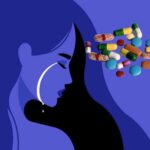What Happens When A Normal Person Takes Antidepressants?

The history of antidepressants began, by chance, in the 1950s. Chemists developing a new treatment for tuberculosis tested the drug iproniazid on patients at Seaview Hospital on Staten Island. It was a crucial step in the history of depression treatment, as these patients experienced a dramatic change in well-being.
Antidepressants can help relieve symptoms of depression, social anxiety disorder, anxiety disorders, seasonal affective disorder, dysthymia, or mild chronic depression, as well as other conditions. They aim to correct chemical imbalances of neurotransmitters in the brain that are believed to be responsible for changes in mood and behavior.
According to the Centers for Disease Control and Prevention (CDC), the percentage of people aged 12 years and over using antidepressants in the United States rose from 7.7 percent in 1999-2002 to 12.7 percent in 2011-2014. Around twice as many females use antidepressants as males. But what happens when a person who is not depressed takes these medications.
What can happen when a person without depression takes antidepressants?
This is a common question many people ask, low dose antidepressants are actually given to people who are not depressed because “antidepressants” aren’t just that, they have effects beyond the brain. The first tricyclic antidepressant was first used as an antihistamine before its psychiatric effects were realized. Tricyclic antidepressants at low doses are used as analgesics, and for irritable bowel syndrome. In addition, psychiatric conditions other than depression are frequently treated with medicines in various classes known as “antidepressants.” Selective Serotonin Reuptake Inhibitors (SSRIs) are used for people with anxiety disorders who are not depressed as well as in depressed patients. Sometimes they are used to assist psychotherapies for these disorders.
It is important to note that a low dose of one class of antidepressants would not have the same effects as a low dose of another class. It’s similar to aceteminophen and ibuprofen: they both treat pain, but they’re in different classes.
Let’s say you choose an SSRI (selective serotonin re-uptake inhibitor), such as Prozac (fluoxetine). The actions of SSRI’s are isolated to their name for the most part. Which means you would get a small increase of serotonin in your neural synapses. Theoretically, this could result in all sorts of actions, but most likely you wouldn’t notice a difference, except maybe a slight headache or insomnia or you might sleep better. The experiences of folks on SSRI’s are pretty varied and individualized since our brain chemistry is somewhat varied.
If you choose a tricyclic antidepressant like amitryptylline or cyclobenzaprine (a muscle relaxant that structurally is similar to tricyclics) your results will be different, because this hits different receptors.
However, it is important to note that taking antidepressants comes with the risk of serotonin syndrome, which is potentially fatal as it can cause nasty stuff like convulsions and seizures, dissociative symptoms, fatal heart arrhythmia, and respiratory difficulties.
Abusing antidepressants may counter-intuitively, trigger a clinical depression or a manic episode in people prone to, but hitherto undiagnosed with, bipolar tendencies.
Side effects
Whether you are depressed or not, taking an antidepressant comes with side effects. If side effects seem intolerable, you may be tempted to stop taking an antidepressant or to reduce your dose on your own. Don’t do it. Your symptoms may return, and stopping your antidepressant suddenly may cause withdrawal-like symptoms. Talk with your doctor to help identify the best options for your specific needs. The following tips provided by Mayo Clinic may help:
Nausea: Nausea typically begins early after starting an antidepressant. It may go away after your body adjusts to the medication.
Consider these strategies:
- Take your antidepressant with food, unless otherwise directed.
- Eat smaller, more-frequent meals.
- Suck on sugarless hard candy.
- Drink plenty of fluids, such as cool water. Try an antacid or bismuth subsalicylate (Pepto-Bismol).
- Talk to your doctor about a dosage change or a slow-release form of the medication.
Increased appetite, weight gain: You may gain weight because of fluid retention or lack of physical activity, or because you have a better appetite when your depression symptoms ease up. Some antidepressants are more likely to cause weight gain than others. If you’re concerned about weight gain, ask your doctor if this is a likely side effect of the antidepressant being prescribed and discuss ways to address this issue.
Consider these strategies:
- Cut back on sweets and sugary drinks.
- Select lower calorie nutritious foods, such as vegetables and fruits, and avoid saturated and trans fats.
- Keep a food diary — tracking what you eat can help you manage your weight.
- Seek advice from a registered dietitian.
- Get regular physical activity or exercise most days of the week.
- Talk to your doctor about switching medications, but get the pros and cons.
Fatigue, drowsiness: Fatigue and drowsiness are common, especially during the early weeks of treatment with an antidepressant.
Consider these strategies:
- Take a brief nap during the day.
- Get some physical activity, such as walking.
- Avoid driving or operating dangerous machinery until the fatigue passes.
- Take your antidepressant at bedtime if your doctor approves.
- Talk to your doctor to see if adjusting your dose will help.
Insomnia: Some antidepressants may cause insomnia, making it difficult to get to sleep or stay asleep, so you may be tired during the day.
Consider these strategies:
- Take your antidepressant in the morning if your doctor approves.
- Avoid caffeinated food and drinks, particularly late in the day.
- Get regular physical activity or exercise — but complete it several hours before bedtime so it doesn’t interfere with your sleep.
- If insomnia is an ongoing problem, ask your doctor about taking a sedating medication at bedtime or ask whether taking a low dose of a sedating antidepressant such as trazodone or mirtazapine (Remeron) before bed might help.
Dry mouth: Dry mouth is a common side effect of many antidepressants.
Consider these strategies:
- Sip water regularly or suck on ice chips.
- Chew sugarless gum or suck on sugarless hard candy.
- Avoid tobacco, alcohol and caffeinated beverages because they can make your mouth drier.
- Breathe through your nose, not your mouth.
- Brush your teeth twice a day, floss daily and see your dentist regularly. Having a dry mouth can increase your risk of getting cavities.
- Talk to your doctor or dentist about over-the-counter or prescription medications for dry mouth.
- If dry mouth continues to be extremely bothersome despite the efforts above, ask your doctor the pros and cons of reducing the dosage of the antidepressant.
Constipation: Constipation is often associated with tricyclic antidepressants because they disrupt normal functioning of the digestive tract and other organ systems. Other antidepressants sometimes cause constipation as well.
Consider these strategies:
- Drink plenty of water.
- Eat high-fiber foods, such as fresh fruits and vegetables, brans, and whole grains.
- Get regular exercise.
- Take a fiber supplement (Citrucel, Metamucil, others).
- Ask your doctor for advice on stool softeners if other measures don’t work.
Dizziness: Dizziness is more common with tricyclic antidepressants and monoamine oxidase inhibitors (MAOIs) than with other antidepressants. These medications can cause low blood pressure, resulting in dizziness.
Consider these strategies:
- Rise slowly from sitting to standing positions.
- Use handrails, canes or other sturdy items for support.
- Avoid driving or operating machinery.
- Avoid caffeine, tobacco and alcohol.
- Drink plenty of fluids.
- Take your antidepressant at bedtime if your doctor approves.
Agitation, restlessness, anxiety: Agitation, restlessness or anxiety can result from the stimulating effect of certain antidepressants. Although having more energy can be a good thing, it may mean you can’t relax or sit still even if you want to.
- Consider these strategies:
- Get regular exercise, such as jogging, biking or aerobics, or some type of physical activity, such as walking. Talk to your doctor first about what would be a good type of exercise or physical activity for you.
- Practice deep-breathing exercises, muscle relaxation or yoga.
- Consult your doctor about temporarily taking a relaxing or sedating medication or switching to an antidepressant that isn’t as stimulating.
- Be alert for racing or impulsive thoughts along with high energy. If these develop, talk to your doctor right away because they may be signs of bipolar disorder or another serious disorder.
Sexual side effects: Many antidepressants cause sexual side effects. They can include reduced sex drive and difficulty reaching orgasm. Some antidepressants may cause trouble getting or keeping an erection (erectile dysfunction). Selective serotonin reuptake inhibitors (SSRIs) are more likely to cause sexual side effects than other antidepressants are.
Consider these strategies:
- Consider a medication that requires only a once-a-day dose, and schedule sexual activity before taking that dose.
- Talk to your doctor about switching to an antidepressant that may have fewer of these effects, such as bupropion (Wellbutrin, SR, Wellbutrin XL, others), or adjusting your medication to ease sexual side effects.
- Talk to your partner about your sexual side effects and how they change your needs. Adjusting your sexual routine may be helpful. For example, you may need a longer period of foreplay before having sexual intercourse.
- Talk with your doctor about options for medications, such as sildenafil (Viagra), that may temporarily ease sexual side effects or treat erectile dysfunction and any associated risks. Avoid over-the-counter herbal supplements that promise increased sexual desire and function — these are not regulated by the Food and Drug Administration (FDA) and some could be dangerous to your health.
Heart-related effects: Depending on your heart health and the type of antidepressant you take, you may need an electrocardiogram (ECG) before or periodically during treatment. The ECG is used to monitor what’s called the QT interval to make sure it’s not prolonged. A prolonged QT interval is a heart rhythm condition that can increase your risk of serious irregular heart rhythms (arrhythmias).
Certain antidepressants should not be used if you already have heart problems or if you’re taking an MAOI. Talk with your doctor about your heart health and any heart medications or other medications that you take.
Genetic variations: Some studies indicate that variations in genes may play a role in the effectiveness and risk of side effects of specific antidepressants. So your genes may, at least in part, determine whether a certain antidepressant will work well for you and whether you’re likely to have certain side effects.
Some locations already provide limited genetic testing to help determine antidepressant choice, but testing is not routine and it’s not always covered by insurance.
More studies are being done to determine what might be the best antidepressant choice based on genetic makeup. However, genetic testing is a part of — not a replacement for — a thorough psychiatric exam and clinical decisions.





